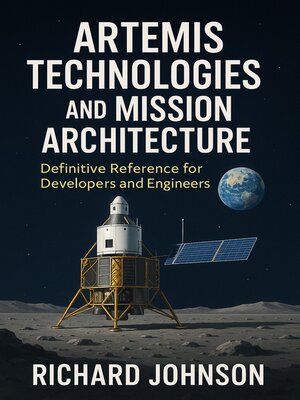Artemis Technologies and Mission Architecture
ebook ∣ Definitive Reference for Developers and Engineers
By Richard Johnson

Sign up to save your library
With an OverDrive account, you can save your favorite libraries for at-a-glance information about availability. Find out more about OverDrive accounts.
Find this title in Libby, the library reading app by OverDrive.



Search for a digital library with this title
Title found at these libraries:
| Library Name | Distance |
|---|---|
| Loading... |
"Artemis Technologies and Mission Architecture"
"Artemis Technologies and Mission Architecture" is a comprehensive guide to the technical, operational, and organizational underpinnings of NASA's Artemis lunar exploration initiative. Drawing on the historical legacy of Apollo and more recent space programs, the book meticulously details the Artemis mission framework, illuminating the scientific, economic, and policy drivers that shape lunar exploration. Readers will gain insight into the multi-stakeholder collaborations that facilitate this ambitious program—from national space agencies and commercial partners to the legal and regulatory considerations necessary for international cooperation and technological innovation.
Spanning the breadth of mission systems, the book explores launch vehicle architectures, advanced propulsion technologies, and the integration of commercial launch assets, as well as the design, safety, and autonomous capabilities of the Orion spacecraft and Lunar Gateway. In-depth technical chapters address the Human Landing System, lunar surface habitats, rovers, in-situ resource utilization, and robotics, describing not only the enabling technologies but also the strategies for reliability, mission assurance, and risk management under the extreme conditions of cislunar space and the lunar surface.
Concluding with a forward-looking perspective, "Artemis Technologies and Mission Architecture" examines emergent technologies—such as additive manufacturing, advanced materials, artificial intelligence, and sustainability frameworks—that are instrumental in supporting long-term lunar presence and future Mars missions. This book is an essential resource for engineers, mission planners, policy makers, and anyone invested in the future of human spaceflight and the expansion of the cislunar economy.







